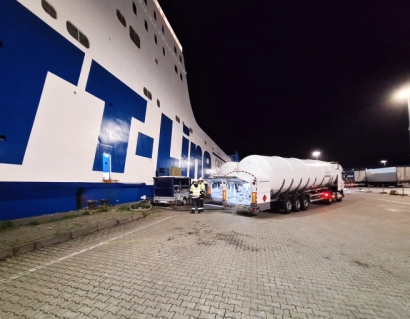“We are delighted to be able to supply TT-Line’s Ro-Pax ferries, a combination of passenger and vehicle ships, with our renewable fuel bio-LNG,” says Markus Pille, Managing Director of EnviTec Energy GmbH & Co. KG.
Since the entry into force of the EU Regulation on the use of renewable and low-carbon fuels in maritime transport, also known as FuelEU Maritime, shipping companies such as TT-Line are required to comply with binding limits for the greenhouse gas intensity of the energy used on board. The regulation applies to all ships in the EU with a gross tonnage of more than 5,000 in commercial passenger or freight transport, regardless of the flag they fly.
This rule will also continue to apply until further notice. The International Maritime Organization – IMO for short – only recently postponed its decision on a global climate regime for shipping, the so-called “Net Zero Framework,” by one year. The framework would, for the first time, have introduced a global CO₂ price for an industrial sector and set the roadmap for the industry’s climate neutrality by 2050.
“Our Peter Pan, together with her sister ship Nils Holgersson, is the largest LNG-powered Ro-Pax ferry in the world. These ferries represent far more to us than merely meeting legal requirements; we are preparing ourselves and our fleet as well as possible for a sustainable future. We have already carried out extensive bio-LNG bunkerings by bunker barge this year and are now pleased to have found, in EnviTec Biogas, a German partner for particularly flexible bunkering by truck,” says Torben Nikolay, CFO of TT-Line.
TT-Line connects the German Baltic Sea ports of Travemünde and Rostock as well as the ports of Świnoujście in Poland and Klaipėda in Lithuania with the southern Swedish transport hubs of Trelleborg – Sweden’s largest ferry port – and, since April 2023, Karlshamn. Its transport performance amounts annually to approx. 1 million passengers, 250,000 cars and approx. 500,000 freight units. TT-Line is therefore the market leader in traffic to southern Sweden.
The bio-LNG produced by EnviTec Biogas reduces emissions by up to 100% compared to marine diesel and thus provides shipping companies with a better starting point with regard to the targets for reducing greenhouse gas emissions under the FuelEU Maritime Regulation.
EnviTec Biogas produces its bio-LNG from organic biomass waste such as slurry, dried poultry manure, food waste or agricultural residues. In a first step, the input materials are processed into biogas, then upgraded to biomethane via EnviThan gas upgrading, and subsequently liquefied into bio-LNG. For this purpose, EnviTec can draw, among other sources, on the bio-LNG produced at Germany’s largest integrated bio-LNG plant, the company’s own BioEnergie Park Güstrow. With this plant, the manufacturer and operator of biogas and gas upgrading plants has also been acting as an independent supplier of carbon-neutral fuel on the market since 2023.
